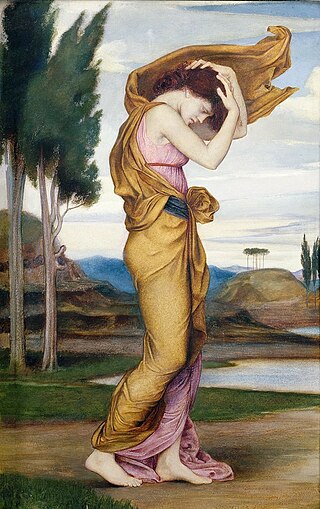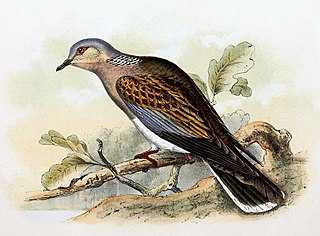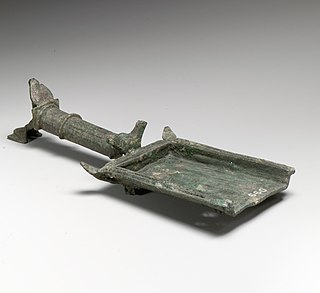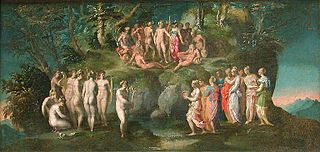Related Research Articles

Deianira, Deïanira, or Deianeira, also known as Dejanira, is a Calydonian princess in Greek mythology whose name translates as "man-destroyer" or "destroyer of her husband". She was the wife of Heracles and, in late Classical accounts, his unwitting murderer, killing him with the poisoned Shirt of Nessus. She is the main character in Sophocles' play Women of Trachis.
Chalciope, in Greek mythology, is a name that may refer to several characters.
There were two characters named Epeius or Epeus in Greek mythology.

In Greek mythology, Hippocrene was a spring on Mt. Helicon. It was sacred to the Muses and formed when Pegasus struck his hoof into the ground, whence its name which literally translates as "Steed/Horse's Fountain". The water was supposed to bring forth poetic inspiration when imbibed.

In Greek and Roman mythology, Iapyx, Iapux or Iapis was a favorite of Apollo. The god wanted to confer upon him the gift of prophecy, the lyre, etc.; but Iapyx, wishing to prolong the life of his father, preferred the more tranquil art of healing to all the others.

Fides was the goddess of trust and good faith in Roman paganism. She was one of the original virtues to be considered an actual religious divinity. Fides is everything that is required for "honour and credibility, from fidelity in marriage, to contractual arrangements, and the obligation soldiers owed to Rome." Fides also means reliability, "reliability between two parties, which is always reciprocal." and "bedrock of relations between people and their communities", and then it was turned into a Roman deity and from which we gain the English word, 'fidelity'.
Pythius is a Lydian mentioned in book VII of Herodotus' Histories, chh. 27-29 and 38-39. He is the son of Atys, and the grandson of Croesus, the last native king of Lydia before the Persian conquest.

Harry Thurston Peck was an American classical scholar, author, editor, historian and critic.
The Hamaxobii, Anglicized Hamaxobians or Amaxobians, were a nomadic tribe who lived in chariots with leather tents mounted on them. They were Scythians. They were said to be descendants of the Medes.
Banzi is a town and comune in the province of Potenza, Basilicata, southern Italy.
Parrhasia was a region in south Arcadia, Greece. Parrhasius, son of Lycaon gave it his name.

In classical antiquity, a baptisterium was a large basin installed in private or public baths into which bathers could plunge, or even swim about. It is more commonly called natatorium or piscina.

Batillum or vatillum was an ancient Roman iron shovel with a short handle used for various purposes, especially as a fire-shovel, chafing-dish, and for burning incense.

Clothing in ancient Greece primarily consisted of the chiton, peplos, himation, and chlamys. Ancient Greek civilians typically wore two pieces of clothing draped about the body: an undergarment and a cloak.
There are several figures in Greek mythology named Manto, the most prominent being the daughter of Tiresias. The name Manto derives from Ancient Greek Mantis, "seer, prophet".
Spurius Mummius was a Roman soldier and writer.

Kinaros, is a small Greek island in the Aegean Sea, named after the artichoke (kinara) which it produced. It is located west of Kalymnos and Leros and east of Amorgos, 5.5 nautical miles west-southwest of Levitha. It is the second westernmost island of the Dodecanese after Astypalea, and has an area of 4.5 km². The island's highest point is 296m. It was noted by several ancient authors including Pliny the Elder, Pomponius Mela, and Athenaeus.

In Greek mythology, the Pierides or Emathides (Ἠμαθίδες) were the nine sisters who defied the Muses in a contest of song and, having been defeated, were turned into birds. The Muses themselves are sometimes called by this name.

In Greek mythology, Leucippus was a Messenian prince. The Boeotian town of Leuctra is said to have derived its name from him.
The lex Cassia de senatu was a Roman law, introduced in 104 BC by the tribune L. Cassius Longinus. The law excluded from the senate individuals who had been deprived of imperium by popular vote or had been convicted of a crime in a popular assembly.
References
- ↑ Peck, Harry Thurston, ed. (1897). Harper's Dictionary of Classical Literature and Antiquities, A-H. Vol. 1 (1st ed.). p. 858.
- ↑ Harper's Dictionary of Classical Literature and Antiquities (2nd ed.). Harper & Brothers. 1898.
- ↑ "Harper's Dictionary of Classical Literature and Antiquities". Harper's New Monthly Magazine. 94 (564). May 1897. (advertisement)